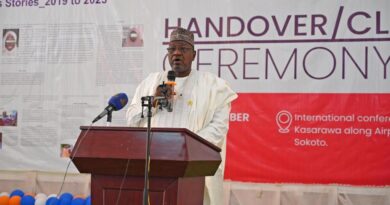CITAB Celebrates Kwara State’s Breakthrough On Visually Impaired Girls’ Education, Demands Genuine, Lasting Inclusion
The Centre for Infrastructural and Technological Advancement for the Blind (CITAB), led by the Executive Chairman Mr. Jolomi George Fenemigho, welcomes the Kwara State Government’s historic approval for immediate admission of visually impaired girls into Queen Elizabeth Secondary School, Ilorin, with promises of free education, feeding, and accommodation.
This was contained in a press release issued today in Lagos by Mr. Fenemigho.
Fenemigho commended the government for finally listening to the chorus of advocacy groups, investigative journalists, and families. After a decade of exclusion, this overdue step finally brings hope and dignity back to the lives of visually impaired girls and their families. The joy expressed by Agnes Daniel, Bushra Abas, Muibat Babanloma, Jariat Mohamonu, and so many others is a testament to the magic that happens when genuine political will meets long-standing dreams.
He credited tireless advocacy and bold journalism for bringing this injustice to light and finally nudging the powers that be to do the right thing. However, Fenemigho warned against forgetting the years of gross institutional neglect that led to this point. Let us not lose sight of the fact that for ten years, visually impaired girls were denied education not only by lack of facilities, but by the deliberate misallocation of resources, notably hostel accommodations meant for students but conveniently reallocated to staff. This represents a blatant violation of equality and fundamental human rights. It’s high time we move from old tales of “not now” to a new story of “never again”.
Despite the passage of the Kwara State People with Disabilities Bill in 2027, Fenemigho emphasized that visually impaired students in Kwara are still treated abysmally by the system. The Bill, with all its fine print, clearly guarantees every child and adult with a disability the right to free, quality, and inclusive education at all levels, without discrimination. Yet, even with this legal safety net, blind and visually impaired students have continued to face exclusion and a lack of appropriate resources. The reality, sadly, reveals a troubling gap between legislative promises and ground-level action. For too many students, the “door to opportunity” has been kept firmly shut, even as the keys to equality gather dust in the corridors of power.
Fenemigho also cautioned that the Kwara State government should not rest on its laurels after the reintegration of these students back to school. This is only the first step, he remarked with emphasis. The government must take further action by ensuring that Queen Elizabeth Secondary School is equipped with the latest assistive learning technology, including a computer lab with screen reader software installed for blind students to use the computers effectively, talking calculators, talking dictionaries, a braille embosser for printing textbooks in braille, and other vital resources. True inclusion means enabling students not only to attend school but to flourish, compete, and prove that disability is no excuse for mediocrity.
He further stressed the importance of recruiting genuinely qualified special educators. It is not enough to simply slap a name tag and call someone a teacher; the government must insist on special educators from recognized institutions of learning and refrain from turning this crucial mandate into a dumping ground for the unqualified or overambitious ‘wannabes’. Professional expertise is not a luxury, it is a lifeline, and our students deserve nothing less than the best that is available.
CITAB, therefore, urges Kwara State not to treat this action as a mission accomplished but as the building block for a genuinely inclusive future. Fenemigho stated that the law calls for more than just good intentions — it demands ongoing investment in assistive technologies and professional development for special education teachers. Inclusion means more than access; it is a living, breathing mandate to give every learner the chance to shine. A single decision can not be paper over years of neglect, but it can open up a new chapter where no child, regardless of ability or gender, is left behind, as the law rightly commands.
CITAB further calls on the Kwara State governor, AbdulRahman Abdulrazaq, to immediately set up a dedicated committee tasked with tracking the progress of Queen Elizabeth Secondary School and the welfare of its visually impaired students. This committee should be responsible for producing detailed periodic reports, keeping the system honest, the stakeholders informed, and ensuring that those mostly affected , in this case, the students and their families , always come first.
CITAB urged the education authorities nationwide to both learn from Kwara State’s mistakes and replicate its rare moment of progress that must become the new norm. Let this intervention ignite a new era for inclusive education across Nigeria. The People with Disabilities Bill makes it clear: equality and barrier-free access should be the rule, not the rare exception, in every classroom. Only through relentless, genuine action can we turn those legal words into a daily reality for all our students.




